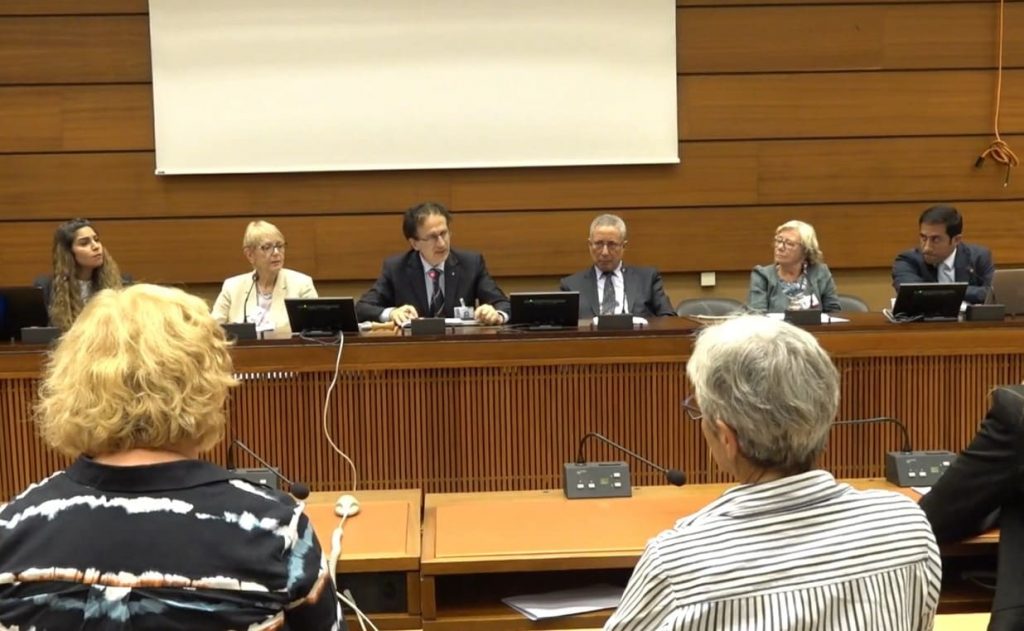Human rights experts on Tuesday called for the renewal of the mandate of the United Nations Fact-Finding Mission on Iran in relation to the crackdown on the women-led protests that began in September 2022 and urged the UN to probe the 1988 massacre of political prisoners in Iran.
JVMI joined several NGOs in a Side Event on Iran, attended by numerous Permanent Missions, during the 54th session of the UN Human Rights Council in Geneva on 3 October 2023.
Speakers included Antonio Stango, President of the Italian Federation for Human Rights (FIDU); Sonja Biserko, Former Member of the UN Commission of Inquiry on Human Rights Violations in North Korea (DPRK) and President of the Helsinki Committee for Human Rights in Serbia; Tahar Boumedra, JVMI Director and former Chief of UNAMI Human Rights Office and Representative of the HCHR in Iraq; Laurence Fehlmann Rielle, Member of the National Council of Switzerland; Neda Amani, Representative of the Iranian Youth Association in Switzerland; and Hanif Asyabani, Iranian human rights activist.
Antonio Stango, who chaired the meeting, expressed concern over the deteriorating human rights situation in Iran.
JVMI Director Tahar Boumedra told the panel Iranian authorities have engaged in a “systematic crackdown” on those seeking truth and justice regarding the 1988 massacre.
“The failure to hold suspect perpetrators of these crimes, like President Ebrahim Raisi, accountable has fuelled a culture of impunity in Iran, which can be seen by the brutal deadly crackdown on current-day people’s protests in Iran,” he said.
“The first step to oppose impunity and secure accountability is for the UN Human Rights Council to renew the mandate of the international Fact-Finding Mission to thoroughly and independently investigate the government’s crackdown on the protests which began in September 2022 and to expand its mandate to the 1988 mass murder of political prisoners.”
Former UN investigator Sonja Biserko told the panel the protest movement in Iran which began in September 2022 has consistently called for accountability and justice.
“Their demands include the overthrow of Iran’s clerical regime and the pursuit of greater social and political freedoms. These nationwide protests represent the most significant challenge to the Islamic Republic in decades and are likely to resurface in the future,” she said.
“To break the cycle of impunity, it is imperative that the UN Human Rights Council renew the mandate of the Fact-Finding Mission to investigate the regime’s crackdown on current protests.”
“It is also of utmost urgency that we renew our call for accountability regarding the 1988 massacre and advocate for the establishment of a UN Commission of Inquiry to investigate these crimes comprehensively. This inquiry should serve as a starting point for investigating all subsequent atrocities.”
In yet another example of the culture of impunity that exists in Iran, members of the state’s Guidance Patrol are believed to have assaulted a teenage girl for not wearing a headscarf in a Tehran metro station, leading to her hospitalisation with serious injuries.
The agents of the so-called morality police attacked Armita Geravand, 16, in the Shohada metro station on 1 October 2023, shoving her so badly that she suffered head trauma and fell into a coma. Her friends said she was bleeding from the head when a nurse or doctor at the metro station gave her CPR and before she was transferred to hospital.

